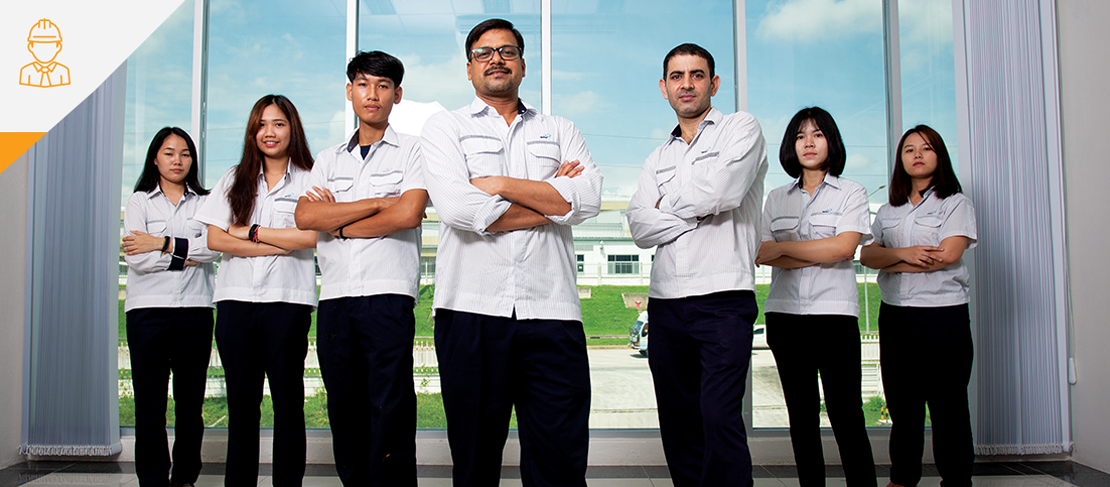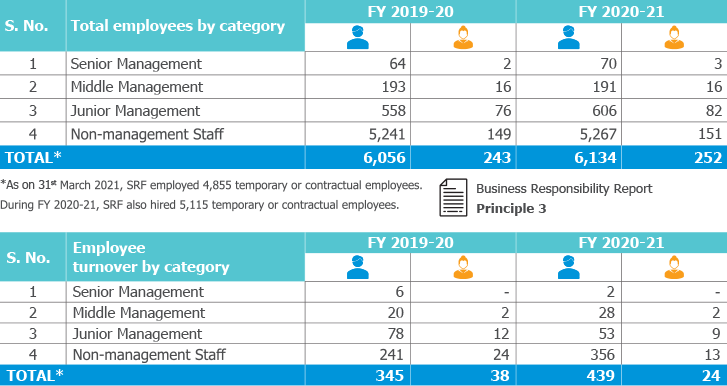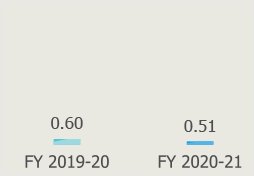An agile workforce for inclusive growth

SRF considers human capital as one of the key enablers for successful implementation of their business strategies. The Company lays great emphasis on building a culture of learning and growth to nurture the talent pool. SRF’s core values ‘RINEW’ are always upheld at all levels within the organization, and thus ensure the achievement of both organizational as well as personal goals. There is a strong focus on creating an engaging experience for employees by providing a favorable working environment that offers opportunities to develop skills, maintain high standards of health, safety and well-being and ensure inclusive growth. Health and safety parameters are considered to be of paramount importance, and thus the organization lays great emphasis on building a safe and secure workplace for its employees.
Through the Talent Transformation Framework, SRF constantly encourages people to learn, develop and discover the potential for professional growth within the organization. This has helped SRF in building an engaging and productive workforce to achieve organizational objectives and create long-term value for all.
Key highlights
Total workforce (Management and non-management Staff)
EHS training imparted to permanent employees
Reduction in number of first-aid cases for all employees Compared to FY 2019-20
Increase in female workforce (across management levels) compared to FY 2019-20
The Company focuses on attracting, developing and retaining the right talent across its business verticals. SRF diligently promotes diversity and inclusion, human rights, continuous learning and development for skill upgradation and employee engagement to create a value-based culture where employees excel along with business growth.
SRF is committed towards building an inclusive workplace that encourages the principles of diversity and inclusion and ensures equal opportunity without any discrimination based on gender, age, caste, race, religion, etc. SRF recognizes the uniqueness of each individual and accepts and respects individual differences. The Company has taken proactive steps to maintain gender diversity, create a mix of diverse work experience and backgrounds, and encourage disability inclusion by providing equal opportunities to persons with disability.
During the current reporting period, the female workforce across the management levels has increased by more than 7% compared to FY 2019-20. During the same period, SRF also employed 15 people with disabilities.

SRF provides a healthy work environment and offers equal growth opportunities to all its employees. The Company’s leave policy includes provision for maternity and paternity leaves for all married employees. In addition, various flexible leave options such as marriage, bereavement, and celebration leaves for employees are also available. Sabbaticals are also offered to eligible employees.
SRF is committed towards the professional development of its workforce and has carefully created a conducive environment that encourages employees to acquire new skills and build on their competence levels. SRF has a structured approach towards training and development of management and non-management staff. Our workforce is skilled to handle various roles at our manufacturing facilities and undergo formal skill development through a rigorous implementation of the skill matrix methodology. Regular trainings along with learning and development e-modules play a vital part in keeping the employee spirits high, improve performance and retain talent.
SRF offers training methodologies that are tailored to the job profiles and business segments. The training modules are broadly classified under the following three categories: Technical, Behavioural and Functional. Training needs of each employee are identified, and a training calendar is developed after consultation with employees and their managers. In addition, a training portal called ‘SOUL’
– SRF Online University of Learning, is in place to monitor training plans and training hours for the employees. For the non-management staff, the training need identification process is manual, and the Company is in the process of automating the system in the coming year. The table below gives a highlight of the training hours of SRF’s workforce over the last two years by employee category.

In brief, during the year 76% of Permanent employees, 85% of Permanent women employees, 97% of Casual/Temporary/ Contractual Employees and 93% of Employees with Disabilities were given safety / skill upgradation training.
During the current reporting period, training hours have reduced compared to the previous year because of the shift to online mode of training due to COVID-19 crisis. During the reporting year, classroom trainings have been discontinued to maintain the COVID-19 protocols. Most of the digital trainings have been for a shorter duration keeping in mind the virtual environment and attention span of employees, thereby impacting the total training hours. The Company continues to endeavor to transition towards a hybrid model (a combination of digital platforms as well as classroom trainings) to impart behavioral trainings, thus enabling a larger impact.

Another critical aspect of employee development and career advancement is the system of regular performance feedback and appraisal for employees. In terms of the evaluation process for employees, periodic performance assessments are conducted, and feedback is duly provided for improvement. SRF has a performance management system that has evolved with time. The organization ensures proper evaluation of management cadre employees on the achievement status of their key performance indicators. During the reporting year, all employees across the senior, middle and junior management levels received performance feedback and underwent a formal career development review through the performance appraisal system. SRF’s 360-degree feedback mechanism also assists managers in modifying their working style from time to time, while promoting a sense of openness in the working environment.
With deeply integrated functions and processes across the organization, the Company provides a platform to grow through job rotation, skill enhancement and career advancement opportunities.
To motivate and retain talent, SRF has put in place a Rewards and Recognition Programme that is purely based on merit and focuses largely on instant gratification. This has been established on the principles of fairness and transparency. The Rewards and Recognition Programme encompasses monetary rewards, non-monetary rewards and informal day-today appreciation across the organization. Apart from exceptional performance, SRF also rewards employees for their long service.
Over the last few years, SRF’s Human Resources team has focused on automation of almost all transactional processes so that HR can spend more time with people, understanding their needs and offer support wherever needed. In addition, special focus on building analytics on ‘People Data’ has aided effective decision making.
SRF is committed to keep human rights intact across its organization as well as across its business partners. The Code of Conduct and Whistleblower Policy sets out the commitment of the Company to protect human rights. The Company provides a safe and productive work environment through the implementation of systems, processes and structured training programmes pertaining to human rights norms and policies, including prohibition of child labor, forced labor, discrimination based on any grounds either in hiring process or among employees and prevention of sexual harassment. SRF has zero tolerance towards violation of human rights across the organization.
Clearly documented policies and procedures are in place to ensure effective resolution in case of any violation. This forms the foundation of the Company’s commitment towards ethical conduct across all levels. The Code of Conduct and Whistleblower Policy mandates and helps in ensuring that employees take utmost care while selecting vendors, business partners, suppliers, etc. SRF maintains strict adherence towards mitigating human rights violation within the organization. During FY 2020-21, there were no complaints or incidents relating to child labor, forced labor, involuntary labor, discrimination or sexual harassment at SRF.
Empowerment and well-being of employees are of utmost importance at SRF and there is a strong belief that motivated employees are a key to organizational success. Regular employee engagement programs are conducted to ensure strong bonding between the employees and the Company. These initiatives also ensure a connect between SRF and the family members of the employees. The Company has a structured process for conducting an annual employee engagement survey for identification of various key areas of improvement, key concerns, and gathering suggestions for future improvements. During the year, overall engagement score as per Employee Engagement Survey 2020 was 93%. This rate has consistently increased over the last few years. In addition to this, several other periodic surveys, open houses and meetings with senior management are conducted to give employees ample opportunities to voice their opinion. The Company also regularly reaches out to its former employees to collect unbiased views on improvements that can be incorporated. The current eNPS* score is much above the industry average.
*eNPS is a score that indicates a former employee’s willingness to re-join the Company. This is calculated independently by an external agency.
SRF offers several platforms to seek feedback and suggestions from its workforce to build an inclusive culture across the organization. This is done through well-established grievance mechanisms, feedback surveys, employee associations, etc.
SRF greatly values the healthy labour relations that the organization has been able to develop at its businesses and plants. The organization places a lot of focus of catering to the leadership needs of people and provide multiple avenues to satiate this need by way of leading various groups and committees formed such as the transport committee, the canteen committee, etc. In addition, developing a strong bond with not just the employee but also his family helps SRF nurture long term healthy relations. Overall welfare of the employees and their families remain a focus area.
The Company has established employee associations, recognized by the management, to provide a platform for dialogue between the management and employees. This helps in seeking suggestions and resolve issues in a fair manner on a continuous basis. About 17% of the permanent employees are members of the employee association.

Safety is an integral part of SRF’s business philosophy. As a responsible organization, SRF strives to ensure a safe and healthy working environment for its workforce. The Company is committed to design, manufacture, handle, store and distribute its products in a healthy and safe manner to ensure well-being of employees, stakeholders and the communities at large.
SRF’s approach for a healthy and safe working environment for its employees is centered around accomplishing the culture of zero injury/fatality/accident incidents at its plants. SRF strives to achieve this by following the guidelines of the Company’s Health and Safety Manual and initiatives led by health and safety committees across the organization. Additionally, all the Plants of SRF’s Packaging Films Business have been certified in accordance with the OHSAS 18001:2007 Standard, which is an international occupational health and safety management system. Also, these plants conform to the Five Star Occupational Health & Safety Standard. SRF is also pleased to highlight that the Bhiwadi Plant of Chemicals Business has recorded zero major accidents in the last 19 years.
Compared to FY 2019-20, there has been a reduction of 53 first-aid cases or cases involving minor accidents for all employees across SRF. During the reporting year, there has also been no case of dangerous occurrence, i.e., cases involving bursting of a plant due to higher steam pressure, collapse or failure of a crane, explosion, fire, burst-out, leakage of molten metal, collapse of any infrastructure, leakage incidence of toxic gases or hazardous substances, bursting of centrifugal machines, etc.




*The health and safety performance data pertain to all employees across SRF.
The Company endeavors to create awareness and embed health and safety in the Company culture by delivering robust health and safety trainings to its workforce to ensure well-being of each employee. Since SRF believes that achieving a safe work environment is a responsibility shared by all employees, such trainings help in developing a culture where each individual takes responsibility of maintaining high standards of health, safety and well-being. This ensures the presence of competent safety practitioners across business operations. The table below details the break-up of total trainings hours for permanent employees covering aspects related to environment, health and safety.
During the current reporting period, EHS training hours have reduced compared to FY 2019-20 levels largely due to safety protocols arising out of the COVID-19 pandemic. Classroom’s trainings have been discontinued and the Company has transitioned to the online mode to deliver trainings to its employees. Online trainings were offered in shorter duration to enable better retention by the trainees, thereby impacting the training hours.
SRF has created EHS Committees to bring about a behavioral change on health and safety across all its facilities. These committees comprise of employees from both the management as well as the non-management workforce. The purpose of these committees is to ensure that all operations meet the requirements of the organization’s EHS Policy and any relevant aspects concerning health, safety and environment are diligently dealt with. SRF has placed systems to monitor and address issues at an early stage to take pre-emptive measures and report near-miss incidents.

Amidst the rising COVID-19 cases across the country, operations at SRF were shut down in order to help curb its spread. SRF realized that to bring in employees to the plants to meet the business requirement while complying with regulatory norms, a safe and secure workplace was needed. SRF got into action to draw out immaculate plans and procedures. SRF ensured that the employees remain motivated, satisfied and safe throughout the COVID-19 situation, while effectively contributing to organisational goals.